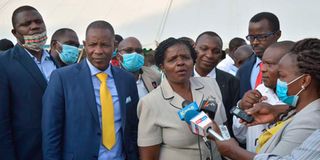Woman Uasu chair shows shifting of gender terrain

The new Uasu chairperson, Dr Grace Nyongesa, speaks to journalists after her election on July 5, 2021.
What you need to know:
- Trade unions comprise of men and women but they have so often excluded the latter in leadership positions.
- Women have always been at the forefront of fighting for workers’ rights, including in the developed countries.
In the national poll held in Nakuru County recently, lecturers picked Nakuru lawyer and Kisii University law lecturer Grace Nyongesa as the first woman chair of University Academic Staff Union (Uasu) to succeed long-serving chair Muga K’Olale, who had resigned the week before.
The lecturers set the pace in showing that women can have a real voice and space in trade union politics and participate equally with men in public dialogue and influence the decisions which determine the future of trade unionism. They also set a perfect example of gender equality and women’s empowerment, which is imperative for inclusive, equitable and sustainable women’s political participation.
Trade unions comprise of men and women but they have so often excluded the latter in leadership positions. Raising the share of women in our unions is not only likely to result in better representation of women’s concerns in policymaking but also lead to higher socioeconomic growth. Women have always been at the forefront of fighting for workers’ rights, including in the developed countries.
In 1888, for instance, women and girls went on strike at the Bryant & May match factory in East London to protest against long hours and appalling working conditions. Their action led to the banning of toxic white phosphorus, which had ruined many lives. The rise of female unionisation in South Africa in early- and mid-20th Century showed their central role in labour. Then, women took up industrial jobs in large numbers for the first time in the country.
Affirmative action
There was discrimination and a lack of acceptable working conditions. Through the leadership of women like Johanna Cornelius, Ray Alexander Simons, Emma Mashinini and Lydia Kompe, women were able to unionise against unfair employers.
Uasu members, therefore, showed other organisations and sectors that a more favourable political climate towards labour can be created for women’s participation and a greater degree of labour organisation is possible with them in leadership.
A favourable political climate should be seen to equate women to men’s leadership in unions. This is evidence that women can compete and win in any field. It is also a challenge to aspiring women and ambitious girls to eye leadership where they have a comparative advantage. Despite that, women are proportionally under-represented in many sectors.
Let us get women more involved at every level of socioeconomic development. Paving the way for more women in the political, business and civic arena is an investment in more just, equitable and peaceful societies. More fundamentally, investing in girls and women creates a ripple effect that yields multiple benefits not only for individual women but also families, communities and countries.
Dr Nyongesa’s victory is part of fulfilment of the constitutional guarantee of gender equality and affirmative action. It mystifies the pessimistic narrative of women’s unelectability and reinforces gender balance in our political sphere.
Dr (PhD) is a lecturer in the school of Education and Human Resource Development at Kisii University. [email protected].




